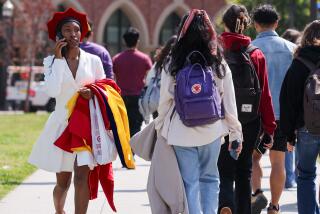Teaching hospital may lose program
- Share via
The program to train cardiologists at Los Angeles County-USC Medical Center has been stripped of its national accreditation by the Chicago-based Accreditation Council for Graduate Medical Education.
The decision, which takes effect in a year, marks the first time a residency or fellowship program at the Boyle Heights facility has lost accreditation.
The council faulted the program for “insufficient teaching time by the faculty,” according to Jane Brust, a spokeswoman for USC’s Keck School of Medicine.
County-USC is one of the region’s premier teaching hospitals, with 52 residency and fellowship programs. The university hopes to fix the problems and have the 21-year-old cardiology program recertified before June 30, 2009, when the accreditation is to be withdrawn.
It is rare for a residency program to have its accreditation involuntarily withdrawn by the council. In the 2006-07 academic year, just 12 programs across the nation were stripped of approval, out of about 2,000 that were up for re-accreditation.
County USC’s three-year cardiology fellowship trains physicians who have completed a three-year residency in internal medicine.
Brust said that the problems in the program never compromised the quality of patient care.
Dr. Keith Yabumoto, one of the program’s 13 fellows, said he and his peers wanted more face-to-face time with experienced cardiologists watching them as they treated patients.
Fellows aren’t at the hospital to simply work, but are there to learn from faculty, Yabumoto said.
But many times, he said, there was inadequate supervision of the fellows.
Brust said the university plans to hire additional faculty and nurse practitioners to assist with patient care. Additional staffing would free up time for teaching.
University officials also decided to appoint Dr. Ray Matthews to take over as head of the cardiology fellowship program from Dr. Gerald Shinbane, who served as head for about a year. Matthews took over the cardiology program in June.
“Dr. Matthews has been an absolute wonderful addition,” Yabumoto said.
If the program fails to be re-accredited, the university might be required to hire experienced cardiologists to take the place of the residents. Brust said the hospital is not planning for that contingency because officials believe they will have the cardiology program’s accreditation restored.
The Accreditation Council for Graduate Medical Education oversees about 8,400 residency and fellowship programs in the United States that train physicians in medical specialties.
Each program is inspected about every three to five years, and the council can penalize programs by withdrawing accreditation or placing them on probation. Teaching hospitals can also voluntarily withdraw their program from accreditation.
Residency programs must be accredited in order to receive federal funding for graduate medical education.
The last Los Angeles County residency programs to have accreditation involuntarily withdrawn were run by Charles Drew University of Medicine and Science.
Drew lost its accreditation for its surgery and radiology programs in 2004 and its neonatal-perinatal fellowship in 2006.
Later that year, the university’s remaining programs to train physicians in various specialties were voluntarily closed down after Los Angeles County officials downsized Martin Luther King Jr./Drew Medical Center near Watts in an attempt to keep its federal funding, which it lost the following year, causing it to shut down.
Although Drew no longer trains physicians after they have graduated from medical school, the university has continued educating medical students and is set to begin accepting students to the Mervyn M. Dymally School of Nursing next year.
---
More to Read
Sign up for Essential California
The most important California stories and recommendations in your inbox every morning.
You may occasionally receive promotional content from the Los Angeles Times.











